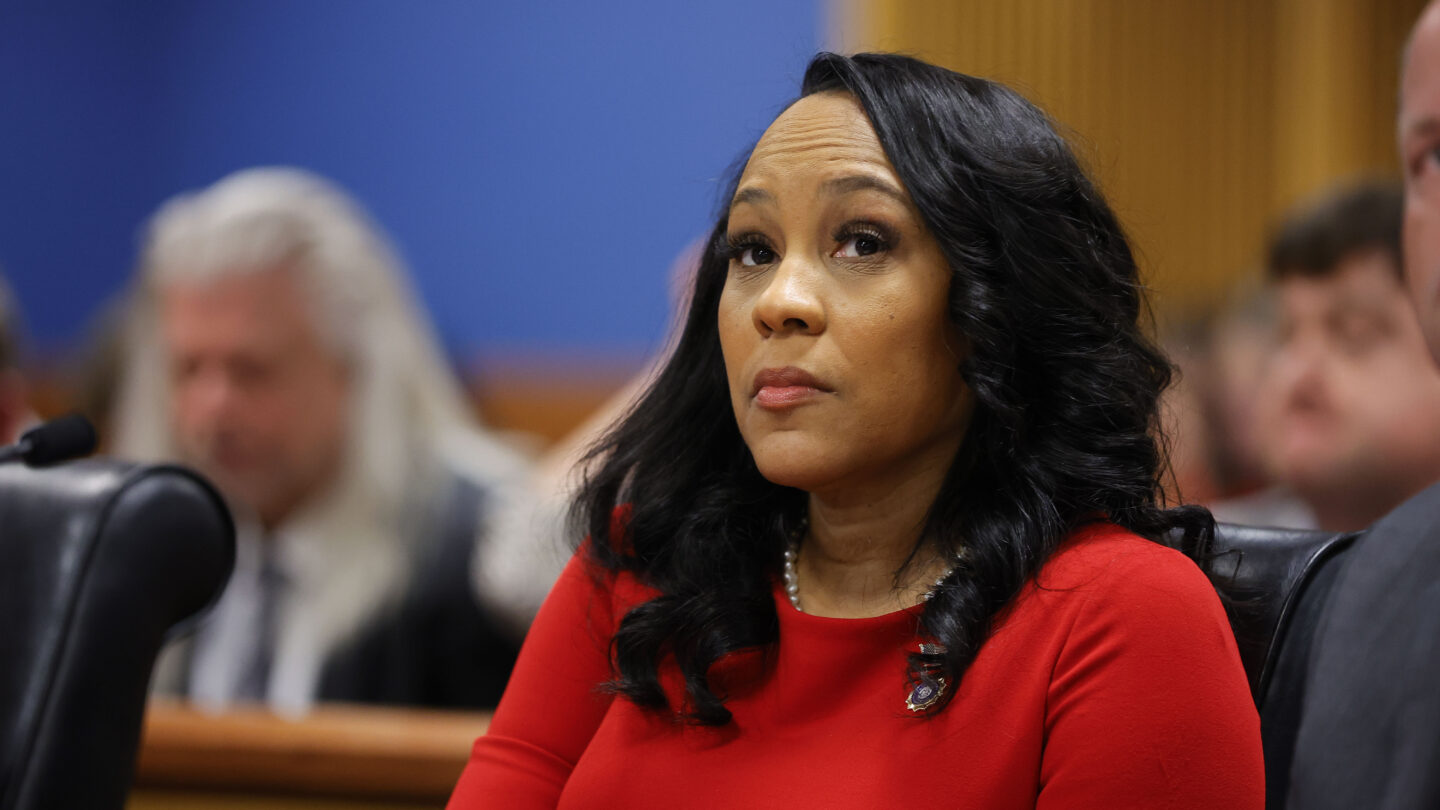Updated at 4:01 p.m.
Fulton County District Attorney Fani Willis has accepted the resignation of special prosecutor Nathan Wade. That’s after a judge ruled Willis could only remain on the Georgia election interference case if Wade stepped aside.
In a 23-page ruling that followed hours of dramatic courtroom testimony last month, Fulton Superior Judge Scott McAfee ruled that Willis’ romantic relationship with Wade, the top special prosecutor she hired, created the appearance of a conflict of interest, but did not require her disqualification.
McAfee wrote, “An outsider could reasonably think that the District Attorney is not exercising her independent professional judgment totally free of any compromising influences. As long as Wade remains on the case, this unnecessary perception will persist.”
McAfee gave prosecutors a choice. If Wade did not resign from the case, Willis would have to step aside and “refer the prosecution to the Prosecuting Attorneys’ Council for reassignment.”
The decision marks a significant turning point in the multi-year-long quest to investigate efforts to undermine the 2020 election result in Georgia. Willis, the first Black woman elected district attorney in Fulton County, took office just days before the Jan. 6 attack on the U.S. Capitol. Though appeals are expected, prosecutors and the judge can turn their focus back on moving the case toward trial.
Earlier this week, McAfee quashed six counts in the indictment, though 35 still remain.
Known for her sharp courtroom skills and affinity for deploying Georgia’s racketeering law to prosecute complex webs of criminal activity, Willis guided the case through months of investigation by a special investigative panel to a grand jury, which handed up a sweeping indictment of 19 people last August. The case focuses on efforts by Trump and his allies to overturn Georgia’s 2020 election result by pressuring state officials and election workers, submitting a slate of false electors and attempting to tamper with sensitive voting equipment.
In January, one of the co-defendants, former Trump campaign official Michael Roman, accused Willis of misconduct that threatened to blow up, or at least derail, the case. Roman alleged that Willis enriched herself off the case by taking fancy vacations with Wade, funded by his compensation for the case. Willis and Wade said she paid her own way on the trips or reimbursed him in cash for her share of the expenses.
During a multi-day evidentiary hearing last month, lawyers sparred over when Willis and Wade’s relationship began – and over the veracity of their claims that Willis reimbursed Wade in cash.
As prosecutors fought a subpoena for Willis to take the stand, the district attorney appeared in the courtroom and declared that she wanted to testify. Willis and defense attorneys sparred over intimate personal details, the testimony became so tense that McAfee had to call for a five-minute recess.
In the end, McAfee found that “the evidence demonstrated that the financial gain flowing from her relationship with Wade was not a motivating factor on the part of the District Attorney to indict and prosecute.” He also wrote that the defendants failed to show how Willis’ conduct influenced the case.
“Defendants argue that the financial arrangement created an incentive to prolong the case, but in fact, there is no indication the District Attorney is interested in delaying anything,” McAfee wrote.
Still, the judge found that Georgia courts have applied a higher standard – that prosecutors must avoid even the appearance of a conflict.
“Our highest courts consistently remind us that prosecutors are held to a unique and exacting professional standard in light of their public responsibility – and their power,” McAfee wrote. “Every newly minted prosecutor should be instilled with the notion that she seeks justice over convictions and that she may strike hard blows but never foul ones.”
And while McAfee made clear the court does not condone “this tremendous lapse in judgment or the unprofessional manner” of Willis’ testimony last month, he decided that disqualifying a duly-elected district attorney was not necessary, “when a less drastic and sufficiently remedial option is available.”
At 34, McAfee is the newest judge for the Superior Court of Fulton County. He was sworn in about a year ago, after being appointed by Republican Gov. Brian Kemp. He is currently running for election to a full term and has been lauded for his even-keeled approach to managing courtroom tensions and the complex nature of a sweeping racketeering case involving a former president.
“What Judge McAfee has done twice this week now, has been to be very careful in explaining the choices he’s making, what the law commands, in a way that the public of Fulton County, the public of Georgia, the entire nation and the world can digest the exact thought process that he’s had,” says Anthony Michael Kreis, a Georgia State University law professor who has followed the case closely.
In a statement, Trump’s lawyer Steve Sadow wrote that, “While respecting the Court’s decision… we will use all legal options available as we continue to fight to end this case, which should never have been brought in the first place.”
Prosecutors quickly moved to accept the terms of McAfee’s decision.
“I am offering my resignation in the interest of democracy, in dedication to the American public, and to move this case forward as quickly as possible,” Wade wrote in a letter to Willis on Friday.
In accepting his resignation, Willis thanked Wade for his contributions to the case.
“I will always remember – and will remind everyone – that you were brave enough to step forward and take on the investigation and prosecution of the allegations that the defendants in this case engaged in a conspiracy to overturn Georgia’s 2020 election,” Willis wrote. “You were the one who had the courage to accept the role, even though you did not seek it.”
While Willis will remain on the case, the allegations could leave lasting damage. Georgia Republicans have initiated several avenues to investigate Willis. A special state Senate committee with subpoena power launched earlier this year to investigate Willis for alleged misconduct. Georgia Republicans are also implementing a new oversight council with the power to remove elected prosecutors for misconduct.
Potential jurors in the election interference case have undoubtedly watched the drama unfold over recent weeks, potentially coloring their opinion of the integrity of the prosecutor and the case, though Kreis doubts that will be top of mind by the time the case makes it to trial.
“People have a very short memory,” Kreis says. “We are looking at a very late 2024, perhaps even early 2025 trial. There’s a lot of daylight between now and the beginning of a trial here in Fulton County.”
Four defendants have already pleaded guilty to crimes related to efforts to overturn the 2020 election result, but a trial date is yet to be set for the remaining defendants, as McAfee navigated an unwieldy array of more than a dozen defendants, their lawyers and the packed legal calendar of the former president.








